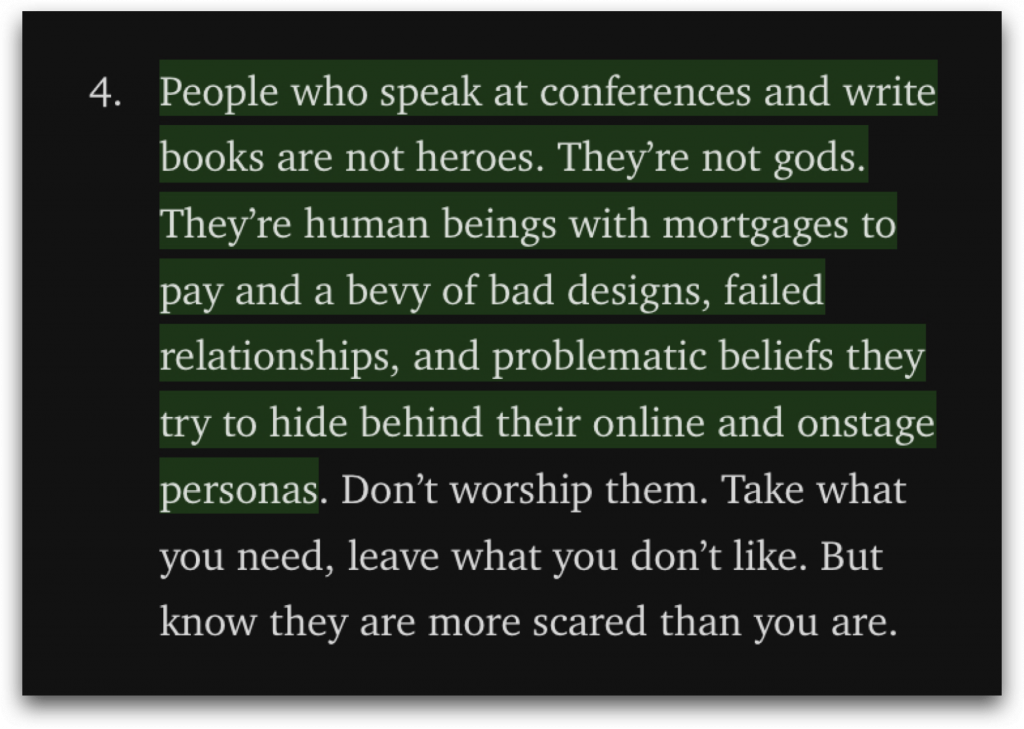Dedicated to PhD Students everywhere, may you find the right path either inside or outside the academy. And with thanks to Maia Sauren for listening to my post academic angst and feedback on this talk.
This started as a Why You Should’ve Started Blogging Yesterday talk for VisMatters21. It has been just over six months since I started blogging. I once had an overwhelming fear of doing it but now it is a sense of joy in a world where we increasingly have to find solace in the smaller pleasures. At first I was scared because I was a PhD dropout. Who would want to listen to me now that I didn’t have the academic qualifications to back it all up? I had failed at what I had set out to do in 2018. I had failed in pretty spectacular fashion because I had plowed through a good amount of savings in a giant hypomanic episode of what is now suspected bipolar 2. Plus, I hadn’t maintained a professional web presence as it had become unsustainable to have a public design portfolio, nor had I created a place for talks I had really worked hard on to live beyond the people who came to see them (thank you for being my audience!).
The truth of that is though I felt I had been masking that bipolar-ish side of me for years, although cluey friends who have known me for a long time had noticed. I shut off my social media now if I feel ‘high’, and this makes it harder to maintain a considered web presence. I was confused by how I could have these bursts of being very highly sociable, and staying up very late working and seemingly getting little done and then struggle to accomplish anything 6 months later or talk to anyone beyond my best friends and family. Blogging is kind of perfect for me because it doesn’t have that kind of immediate cadence to it, you can save what you’ve done and come back to it later. I have plenty more articles and thoughts to share that aren’t fully formed yet. This doesn’t mean that microblogging is any lesser! Some people write well considered amazing threads on Twitter or infographics on Instagram. I just want you to get your message and content out there however you like and what works for you.
I have also realised in the previous few months that life is not about trying to put yourself under immense pressure to try and do something new in the field whilst holding down a professional job. It is about giving enough rest and putting only a little pressure on yourself to accomplish things in a smart way. That is why I think at least everyone interested in any subject matter should consider blogging.

Regardless of whether you’re an academic or not, I think you should consider blogging. If you’re a PhD student I think you should especially consider it. The academic job marketplace is not a friendly place, and #AcademicTwitter has often informed me that your plan B is more likely to become a plan A. I know it’s a lot but I will share the steps I think you should take to get started. I think I blogged my way out of that dark place because I realised I still had something to offer. I had learned better writing skills during my PhD, and I still had knowledge to share. I am still curious, and although I am no longer on an academic path, I am creating a record of learning that will help me irregardless of whether I ever want to go back or not.
Step 1: Let go of the myth that you’re not good enough

Let go of the myth you are not good enough. Or that somehow it is too late. Or that people who do this are somehow inherently better than others. They’re just people, and mostly their expertise is based on reading books and starting somewhere. You are possibly a future version of them anyway.
There is always going to be the one person you know who has been doing this for years and looks amazingly brilliant at it. I guarantee that person still has more things to learn and is still struggling at something else. I go through periods where EVERYTHING is a damn struggle. But I detach from judging myself from the potential work I could’ve done. This is especially hard when you’re in academic study where there is just an ever expanding net of things you could be doing. The good news is that blog posts are a much lower bar of quality than your standard academic paper and can give a big confidence boost if you find that someone enjoys it.
Here is a list of potential blog posts that you could have buzzing around now:
- 101s on an emerging technology
- How to do this certain thing you might be the next expert on
- Lists of resources in new technology (people like a collection of GOOD links)
- A check point list of things to make a project work (think what I did for remote workshops, there isn’t much detail, it’s a recipe)
- For example: 10 rules VR accessible to all (I would really love to read that from someone in the field)
If you’re really struggling I recommend Lauren Currie’s 30 Visibility Prompts that can last for up to 6 months of posts.
Step 2: Make a BIG list

Working out in the open is a great way to get your thinking process kicked off. Any ideas that aren’t big enough for your PhD or research are probably excellent blogging ideas. And if you’re a non academic, any ideas you don’t have to write a report on are a great place to start. Sometimes they might spiral into something bigger at a later date. There is no shame in making shorter, punchier articles from what was initially a bigger idea.
Here’s what I do, take an A5 piece of paper (not too big, argh, pressure!) and list as many ideas that come to you. As you can see from the paper I did this on a Wednesday then kept updating it. Underline the ones you have some content on or even just the beginning research. You can be a beginner at these topics you don’t need to write a thesis. These can be ideas maybe you half wrote some time ago maybe at the beginning of your PhD that were discarded for bigger topics. A blog post can be 700-800 words – any longer than that attention spans drop.
It is also a great place to practice writing succinctly. Blog posts don’t demand you cram in as many citations into the one sentence. Or am I the only one who does this?
Step 3: Promote

This is a step that most people cringe about is telling people about their work. But I guarantee you already have an audience, if you are on LinkedIn (and we’ve all been brought into that big happy family) you already have people that are looking for something in amongst the not so good self promotion. But if you’re waiting for the perfect moment to tell people about your writing, just remember this quote from businesswoman and service designer, Lauren Currie
“You will never feel ready.”
Lauren Currie
There is not going to be a perfect moment to tell everyone about the thing you’ve written. There is never going to be a perfect time to start.
My referrers to my platform in terms of traffic go a bit like this
- Professional Networks (e.g. Slacks)
- Medium (which I import my blogs into)
These all mostly rely on networks I already have and remind mostly people I already know that I exist and this is what I am about. But this is the thing: no one will promote you exactly how you wish to be seen. Self promotion is very important to remind those who you know and their network that this is who you are and this is what you like to work on in your way. Not showing who you are also can have a flow on effect where no one knows where you stand on something, and this is important as companies increasingly look to match their values with that of job candidates.
A note on abuse and harassment
We know that you’re more likely to experience this if you’re part of a marginalised group and there are guides to help like resource centre Crash Override. But remember some people will refuse to engage in promoting themselves online because they are terrified. It is up to you to mitigate the risk and what you’re comfortable with and there are some things I will never post about online. But I do things for my own well being like disabling comments, limiting replies on my Tweets if there is a sensitive subject matter. In preparation for this talk I spoke to a number of prominent people online I know with follower counts in the 1000s on twitter and they said to block often and block early, document the harassment (screenshots and URLs), report the content and encourage others to report it and, if you are in Australia, you can warn the harasser and report to eSafety and the police.
I have been intimidated online by a man I already knew, I blocked him and it went away. But I know I am lucky in that regard.
Emily Van Der Nagel has very kindly offered to help those who want to reach out if this concerns them and you can find her on Twitter.
Other things you can do
Things I have done when I am not feeling entirely comfortable have been only releasing my blog content on LinkedIn (where most people are on their best behaviour) and password protecting my blog content (which you can do on WordPress). I also don’t typically use a photograph of my face on the internet and use a collection of avatars illustrated by my friend Mariko Konno, who is available for commissions.
Step 4: Remind of the Good Things
Good things that have happened to me because of blogging include:
- Job Interviews
- Improved recognition amongst colleagues
- Invitations to present at conferences
- A steady increase of web traffic which I use Matamo Analytics to track
- Increased investment in myself and increased confidence
I have gained a lot by blogging and I’m now a lot better at explaining my ideas and if I need to explain further I can just link people to my blog. I am also starting to use it as a platform for my methods and it is incredibly joyful to see people telling others to bookmark my content or even people who I didn’t think thought that highly of me say the content is great.
Step 5: Share what you know
If you see that someone is not being visible and not promoting their work, gently ask why. It could be that they’re part of a marginalised group or are otherwise uncomfortable putting their work out there. It is always worth seeing what you can do to help people get the recognition that they deserve. Maybe this can include finding them a good audience to share their content with. See what you can do to help e.g. make a faculty blog or organisational blog that gives them something to share a platform with if they’re not comfortable on their own. Let them know you will stick up for them if something goes wrong. Also, if you have a following of your own, promote other’s content or “pass the mic” so that someone can run your social media accounts for a period from an underrepresented group.
If you are more senior than that, see if you can help with sponsoring of writing workshops (I used an editor, Charlotte Goodwin, to help get my content into shape at first, and she is available for freelance). If it is confidence that you struggle with and you’re a woman, I recommend Lauren Currie’s Upfront online course that is free for unemployed women and those on maternity leave, as well as discounts available. Otherwise, encourage your employer to sponsor these activities as part of your learning.
Prolific Academic (and Post Academic) Bloggers
For the academics who are wondering if this is for them I offer the three excellent blogs
The Thesis Whisperer (seriously don’t know how you can do academic study without it)
Not So Ivory Tower because Academia has serious problems
Dr Linda McIver’s Data Education Institute (ADSEI) which now has a wonderful book Raising Heretics
Kardashian Kolloquium, media theory applied to the Kardashian Hyperreality
Kristen Cochrane (@RIPAnnaNicoleSmith) – Internet Ethnography and Cinema Studies
Notes on Setting up WordPress
There we are you got to the end and I hope you’re ready to set up your own blog. You can use anything you want, I used the native Linkedin blog just to get started and that’s very OK to use. For reference, I use WordPress because I am passionate about web accessibility and I chose an accessibility ready theme. For hosting and domain management I used VentraIP and they have answered all my dumb questions regarding WordPress set up.
If you want to get started on WordPress, then great! I am having a good experience thus fat! Here are some other tools I use:
- Matamo Analytics
- WPS Hide Login
- Really Simple SSL (using my SSL from VentraIP)
- Disable Comments
Also if you would like a smashingly lovely logo like mine, go see Elena Fombertaux.
Thanks for the opportunity Cam Edmond, and good luck on your blogging adventures!

